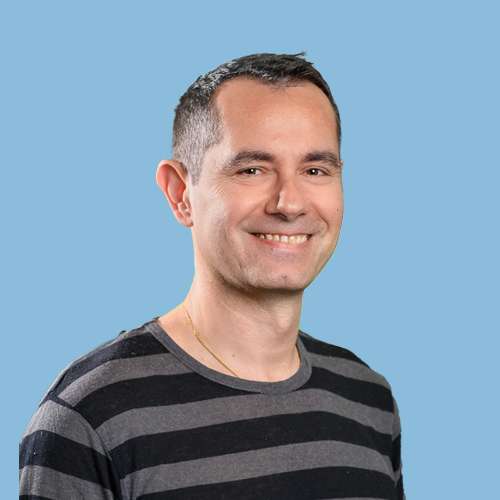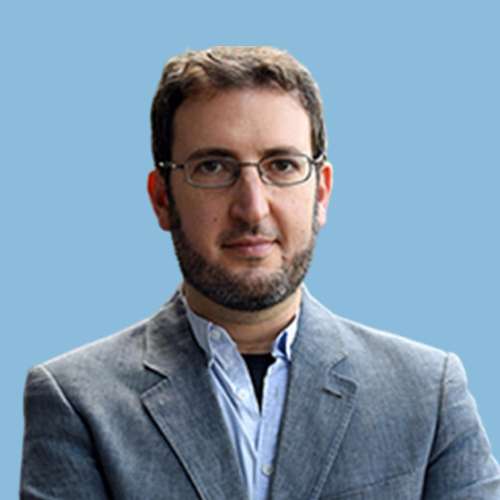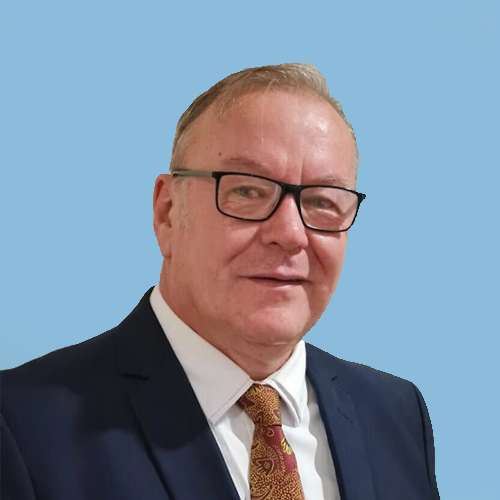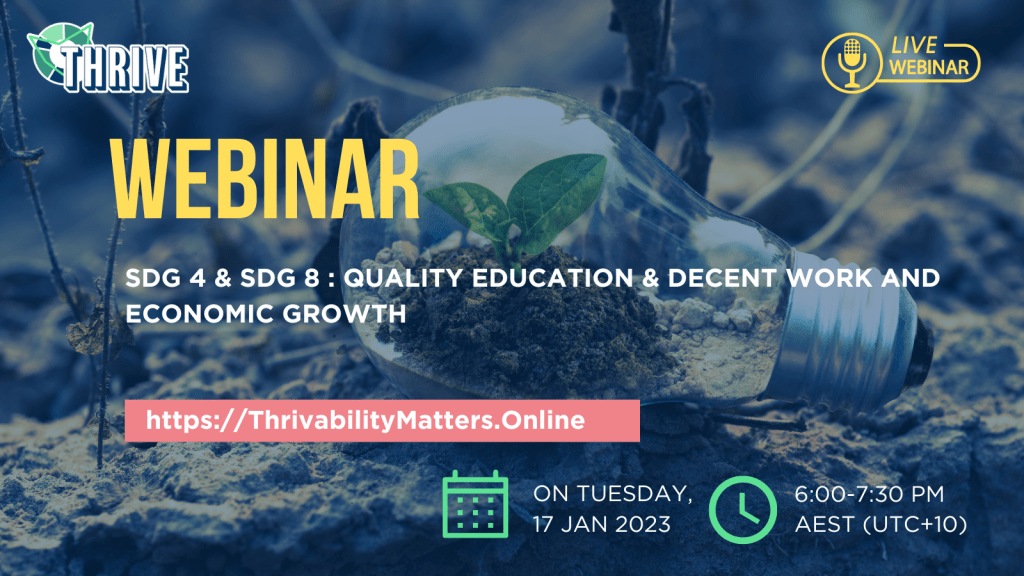The THRIVE project would like to extend our warmest gratitude to Dr Nektarios Karanikas, Dr Ron Levy, and Dr Rhett Martin for giving guest presentations at our December Thrivability Matters Webinar. The theme of this webinar was the United Nations Sustainability Development Goals, (SDG16 & SDG17) (Peace, Justice & Strong Institutions & Partnerships for Goals).
About Our Speakers

Dr Nektarios Karanikas is an Associate Professor of Health, Safety, and Environment at the Queensland University of Technology. Having previously served as an aeronautical engineer with the Hellenic Air Force for 18 years, he has gained much experience in maintenance, quality management, accident prevention, and investigations. He also launched the International Cross-Industry Safety Conference in 2016 to provide a forum for ideas to make safer work environments. Dr Karanikas also holds an MSc in Human Factors & Safety Assessment in Aeronautics. He discussed the biofuel and wind energy sectors, and how workers can be kept safe and protected as they build our energy future.

Dr Ron Levy is an Associate Professor and researcher at the Australian National University who explores the intersection between public law and political theory. He specialises in deliberative democratic theory, has won several academic awards, and published numerous works on law and political theory in five countries. His recent projects explore referendums in deeply divided societies, Indigenous constitutional reform, and the deliberative dimensions of rights practice. With much of his work focusing on environmental constitutionalism, he discussed how fixed constitutional commitments affect environmental outcomes.

Dr Rhett Martin is a senior lecturer at the University of Southern Queensland, and his research focus is on sustainability and its intersection with the law. With degrees in Commerce and Law, he also holds an LLM and a PhD in sustainability regulation. He enjoys educating students about new ways to successfully incorporate principles of ecologically sustainable development into natural resource management and conservation legislation. Dr Martin is a member of two boards that attest to a wider social involvement: the Australian Shakespeare Company Board and the Toowoomba Advocacy and Support Centre Board, which provide advocacy and support for people living with disabilities. In 2022, Dr Martin ran as a candidate for the Queensland Senate Sustainability Party.
Summary Of the Webinar
The THRIVE Project – an organisation that directs humankind on the path toward a more sustainable future – was fortunate to have these three speakers as guest presenters for its monthly Webinar.
Dr Ron Levy on Fixed Constitutional Commitments & Climate Change
Dr Ron Levy started his presentation by discussing fixed and unfixed constitutional commitments. He used the example that fixed commitments are entrenched, enforceable, and have a fixed quantum. He explained that these commitments vary from forest cover minimums to bans on hydraulic fracturing. Dr Levyv elaborated on fixed commitments that are noted as intentionally vague, and that they fall short in stating only that they, “have the environment protected”. These grandiose statements leave wiggle room for the democratic process to fill in, but they provide no grounds for practical enforcement, and other considerations, such as economic ones, may override these unfixed commitments.
Because the ‘contemporary proceduralism’ of modern democracies is slow, it is not well-equipped to tackle the climate change that is taking place as we speak. According to Dr Levy, fixed constitutional commitments may provide corrections to the near-sightedness, partisanship, and vested commercial interests of democracy, as governments may be held accountable to constitutionally entrenched, science-based targets for sustainability. Dr Levy concluded his presentation by stating that the democratic process is still important as it is necessary to deliberate how to meet the goals entrenched by fixed constitutional commitments.
Dr Nektarios Karanikas on Workers’ Health: Missed Opportunities and Gaps in the Wind Energy and Biofuel Sectors
Dr Nektarios Karanikas introduced us to some fundamentals of workplace health & safety. He discussed work-related fatalities and how approximately 80% of said fatalities are due to occupational diseases (an estimated 1.9 million global deaths due to occupational accidents or work-related diseases). This lead him to discuss the importance of occupational hygiene in which evaluating and controlling health hazards play a vital role. In general, he explained that we still need knowledge of workplace processes and the health hazards they produce, the toxicology of hazardous materials, and the effectiveness of different control strategies.
Dr Karanikas then provided us with information on aviation fuels and how there are over two million workers exposed to them every year, remaining harmful to the environment, humans and animals, due to accidental ingestion. Therefore, sustainable aviation fuels are important as they reduce carbon footprint, but they are also costly due to the research required to understand health effects. Currently, it is understood that biofuels might be genotoxic, but even so, these are considered less toxic than conventional fuels.
Wind energy is often discussed as a fairly safe renewable energy source, but one concern is exposure to epoxy resin (a toxic substance) when manufacturing wind turbine blades. There have not been many studies about other risks related to the manufacturing process and installation of wind farms. Dr Karanikas concluded by discussing the importance of renewable energies, and the fact that it is important to consider occupational hygiene and as an opportunity for more robust sustainable practices.
Dr Rhett Martin on the Legal Status of Sustainability
Dr Rhett Martin began by discussing the legal status of sustainability. He explored the broad agreement that uses natural resources in a sustainable way, requiring a balance between economic growth and ecological protection. Therefore, the integration of principles regarding sustainability has been added to the legislation. Dr Martin then asked: “Does this mean sustainability is law?”. According to Dr Martin, it is not. Environmentally sustainable design (ESD) principles in legislation represent procedural challenges, resulting in giving sustainability only a loose legal definition.
He explained that ESD principles do not represent a legally enforceable standard or a legal norm so it is not possible to measure a sustainability outcome. According to Dr Martin, all ESDs may represent is a procedural guideline, although even this is debatable. He discusses the example of how the Great Barrier Reef Marine Park Act has the main object of “… long-term protection and conservation of the environment…” Meaning that there is a legislative duty toward sustainability, but it is not a legal norm that refers to a binding principle. Dr Martin concluded by stating that sustainability needs to be considered sector by sector, and that the principles of ESD in legislation are flawed and in need of acute regulation.
CONCLUSION
Each esteemed speaker discussed different aspects of sustainability in our institutions and policies, but they all refer to sustainability as something that’s not represented strongly enough in each of their fields, lacking measurable goals and entrenched accountability.
If you missed out on the presentations or the live Q&A session, you can view the recording on our YouTube channel.
Make sure to register for the January webinar on SDG4 & SDG8 – Quality Education & Decent Work and Economic Growth.
Thanks, and do keep on thriving!
SUBSCRIBE TO OUR NEWSLETTER
GOT A QUESTION ABOUT THIS TOPIC?
Ask an Expert
COMING UP NEXT MONTH

Next month, we’re focusing on SDG4 & SDG8 – Quality Education & Decent Work and Economic Growth, both increasingly relevant topics. Providing quality education for all is fundamental to creating a peaceful and prosperous world. Children are the future, and education gives people the knowledge and skills they need to stay healthy, attain jobs and foster tolerance, making education one of the most important SDGs. Work rights and sustained & inclusive economic growth drives progress, and is equally important in achieving a thrivable future. Follow us on social media channels and subscribe to our newsletters for further updates on the next month’s content. Register now and save the date!
The THRIVE Project would like to wish everyone who celebrates the festive season a time that is filled with reflection and cherished moments with your nearest and dearest. Have a happy new year, and do keep on thriving!
JOIN OUR UPCOMING WEBINAR